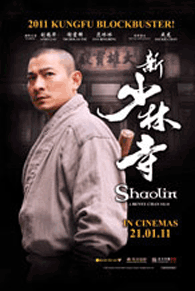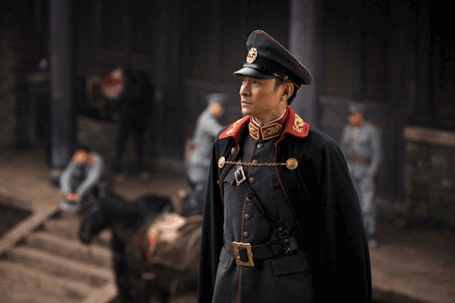
After the disappointing and ridiculous mess that was City Under Siege, Benny Chan has likely learned his lesson that Chinese directors seem to be anathema to comic book movies and happily embarked on a martial arts saga about that hoary old chestnut of Chinese cinema, the Shaolin Temple.
And what a return to form it is for one who has always been among the more talented of Hong Kong’s new directors. Chan has marshalled for Shaolin all the resources at hand to produce a lavish and opulent production with great fight scenes, beautiful cinematography and lavish costuming. Along with 14 Blades and the upcoming Let the Bullets Fly, Chinese cinema may be beginning to rediscover the allure of the spaghetti western, with its outbursts of anarchic violence and its ruthlessly bleak worldview.
At least in the first act of Shaolin, that is, the model applies. It starts off with the film’s hero, Andy Lau, being much a pretty bad guy. Set in the era of the Chinese Civil War, in which a weakened central government was trying to tie together the now-headless factions of the Imperial Army after the death of Generallissimo Yuan and China was generally a free for all, Lau’s character, the warlord Hou Jie, basically sees himself as a survivalist and with good reason. This ruthless warlord gets a change of heart eventually when one of his schemes backfires and his subordinate Cao Man (Nicolas Tse and his goatee channeling a typically psychopathic Spaghetti Western villain) takes over as the main baddie and starts collaborating with two arms dealers of uncertain European origin, apparently played by a German and a Russian while speaking consistently halting Engrish.
Alone, desolate and friendless, having lost everyone he’s even cared about, Hou Jie finds himself taking up the tonsure and joining the Shaolin temple as monk, where enjoying the best of both worlds, he develops a Pacifist worldview while learning to kick more ass than he ever did in his lifetime through the magic of Shaolin martial arts. Of course, the Shaolin temple soon finds itself up to its neck in trouble, and soon Hou Jie must fight back against Cao Man and his foreign collaborators.
By now it should be clear what an absurd melange the plot really is, as is the case for 90 percent of this genre anyway, but while predictable, Shaolin is never boring thanks to its stellar production values and likable characters,as even the ruthless Hou Jie and Cao Man are played with certain sparks of humanity leaving the real inhumanity to the foreign arms dealers of indistinct European origin. Jackie Chan also shines in an extended cameo as an affable chef who also has a few tricks up his sleeve.
Those familiar with the conventions of spaghetti westerns though would be slightly disappointed at the fact that the genre’s frequently pointed criticisms of imperialist ambitions of world powers are not as visible here, despite the vaguely European mercenaries as stand-ins. One wonders why this angle could not have been stoked more for patriotic glee.
Still, as sheer spectacle Shaolin is hard to beat, and this Chinese New Year you couldn’t do better than to see it on the big screen. Part spaghetti western, part old school kung fu, Shaolin is Benny Chan’s magnum opus.












 Printable Version
Printable Version










Reader's Comments
Please log in to use this feature.